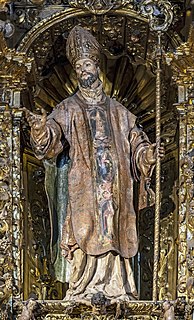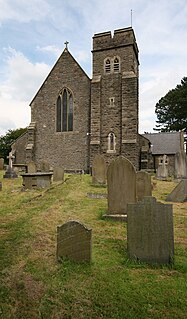Flavius Lucius Dexter (b. 368 AD - d. 444 AD [1] ) was a figure of the late fourth century, [2] reported as a historian, and a friend of St Jerome. He was the son of St Pacian, an imperial office-holder, and dedicatee of a work of Jerome, the De Viris Illustribus . [3]
He was the supposed author of a chronicle, called the Omnimoda Historia or the Chronicle of Pseudo-Dexter. It was in fact a forgery, one of a number of Román de la Higuera's (1538–1611), [4] including the continuation attributed to Marcus Maximus, as scholars now agree. The suspect authorship has been widely known since the work of the Spanish bibliographer Nicolás Antonio, the Censura de historias fabulosas, published in 1742.
Doubts were already cast on these false chronicles before 1600, but controversy continued late into the eighteenth century. [5] The Cistercian François de Bivar (Bivarius) published a commentary and strong defence (Lyon, 1627). [6] Later references to the Chronicle as genuine abound, e.g. its inclusion in part in the Patrologia Latina. [7] [8]
There is a second work attributed to him, In prophetam Danielis de quatuor animalibus ("Against the prophet Daniel on the four animals"). [8]

Eusebius of Caesarea, also known as Eusebius Pamphili, was a historian of Christianity, exegete, and Christian polemicist. He became the bishop of Caesarea Maritima about AD 314. Together with Pamphilus, he was a scholar of the biblical canon and is regarded as one of the most learned Christians of his time. He wrote Demonstrations of the Gospel, Preparations for the Gospel and On Discrepancies between the Gospels, studies of the biblical text. As "Father of Church History", he produced the Ecclesiastical History, On the Life of Pamphilus, the Chronicle and On the Martyrs. He also produced a biographical work on Constantine the Great, the first Christian Emperor, who was augustus between AD 306 and AD 337. He is venerated as a Saint presently in the Syrian Orthodox Church.

Lucius Caecilius FirmianussignoLactantius was an early Christian author who became an advisor to Roman emperor, Constantine I, guiding his Christian religious policy in its initial stages of emergence, and a tutor to his son Crispus. His most important work is the Institutiones Divinae, an apologetic treatise intended to establish the reasonableness and truth of Christianity to pagan critics.
Pope Eleutherius, also known as Eleutherus, was the thirteenth Pope from c. 174 to his death. His pontificte is alternatively dated to 171-185 or 177-193. He is venerated as a Saint in the Catholic Church.

Pope Clement I, also known as Saint Clement of Rome, is listed by Irenaeus and Tertullian as the fourth bishop of Rome, holding office from 88 AD to his death in 99 AD. He is considered to be the first Apostolic Father of the Church, one of the three chief ones together with Polycarp and Ignatius of Antioch.
Philostratus or Lucius Flavius Philostratus, called "the Athenian", was a Greek sophist of the Roman imperial period. His father was a minor sophist of the same name. He was born probably around 170, and is said by the Suda to have been living in the reign of emperor Philip the Arab (244–249). His death possibly occurred in Tyre c. 250 AD.

The Historia Augusta is a late Roman collection of biographies, written in Latin, of the Roman emperors, their junior colleagues, designated heirs and usurpers from 117 to 284. Supposedly modeled on the similar work of Suetonius, The Twelve Caesars, it presents itself as a compilation of works by six different authors, written during the reigns of Diocletian and Constantine I and addressed to those emperors or other important personages in Ancient Rome. The collection, as extant, comprises thirty biographies, most of which contain the life of a single emperor, but some include a group of two or more, grouped together merely because these emperors were either similar or contemporaneous.

Lucius was a legendary 2nd-century King of the Britons and saint traditionally credited with introducing Christianity into Britain. Lucius is first mentioned in a 6th-century version of the Liber Pontificalis, which says that he sent a letter to Pope Eleutherius asking to be made a Christian. The story became widespread after it was repeated in the 8th century by Bede, who added the detail that after Eleutherius granted Lucius' request, the Britons followed their king in conversion and maintained the Christian faith until the Diocletianic Persecution of 303. Later writers expanded the legend, giving accounts of missionary activity under Lucius and attributing to him the foundation of certain churches.

Ralph de Diceto was archdeacon of Middlesex, dean of St Paul's Cathedral, and author of two chronicles, the Abbreviationes chronicorum and the Ymagines historiarum.

Antiquities of the Jews is a 20-volume historiographical work, written in Greek, by the Jewish historian Flavius Josephus in the 13th year of the reign of Roman emperor Flavius Domitian which was around AD 93 or 94. Antiquities of the Jews contains an account of history of the Jewish people for Josephus' gentile patrons. In the first ten volumes, Josephus follows the events of the historical books of the Hebrew Bible beginning with the creation of Adam and Eve.

The gens Flavia was a plebeian family at ancient Rome. Its members are first mentioned during the last three centuries of the Republic. The first of the Flavii to achieve prominence was Marcus Flavius, tribune of the plebs in 327 and 323 BC; however, no Flavius attained the consulship until Gaius Flavius Fimbria in 104 BC. The gens became illustrious during the first century AD, when the family of the Flavii Sabini claimed the imperial dignity.
The Chronicon (Chronicle) or Temporum liber was a universal chronicle written by Jerome. It was one of his earliest attempts at history. It was composed c. 380 in Constantinople; this is a translation into Latin of the chronological tables which compose the second part of the Chronicon of Eusebius, with a supplement covering the period from 325 to 379. Despite numerous errors taken from Eusebius, and some of his own, Jerome produced a valuable work of universal history, if only for the example which it gave to such later chroniclers as Prosper of Aquitaine, Cassiodorus, and Victor of Tunnuna to continue his annals. In conformity with the Chronicon of Eusebius, Jerome dated Creation to 5201 BC.
Titus Flavius T. f. T. n. Clemens was a Roman politician and cousin of the emperor Domitian, with whom he served as consul from January to April in AD 95. Shortly after leaving the consulship, Clemens was executed, allegedly for atheism, although the exact circumstances remain unclear. Over time, he came to be regarded as an early Christian martyr.

The Chronicle of Fredegar is the conventional title used for a 7th-century Frankish chronicle that was probably written in Burgundy. The author is unknown and the attribution to Fredegar dates only from the 16th century.
Justus of Tiberias was a Jewish author and historian living in the second half of the 1st century AD. Little is known about his life, except as told by his political and literary enemy Flavius Josephus.

Johannes Lucius was a Dalmatian historian, whose greatest work is De regno Dalmatiae et Croatiae, which includes valuable historical sources, a bibliography and six historical maps. Due to his critical approach, he is considered the founder of Croatian historiography.
Flavia Domitilla, daughter of Domitilla the Younger by an unknown father, perhaps Quintus Petillius Cerialis, had the same name as her mother and her grandmother Domitilla the Elder. She was thus a granddaughter of Emperor Vespasian and a niece of Emperors Titus and Domitian. She married her cousin, the consul Titus Flavius Clemens, a grand-nephew of Vespasian through his father Titus Flavius Sabinus.

De Viris Illustribus is a collection of short biographies of 135 authors, written in Latin, by the 4th-century Latin Church Father Jerome. He completed this work at Bethlehem in 392–393 AD. The work consists of a prologue plus 135 chapters, each consisting of a brief biography. Jerome himself is the subject of the final chapter. A Greek version of the book, possibly by the same Sophronius who is the subject of Chapter 134, also survives. Many biographies take as their subject figures important in Christian Church history and pay especial attention to their careers as writers. It "was written as an apologetic work to prove that the Church had produced learned men." The book was dedicated to Flavius Lucius Dexter, who served as high chamberlain to Theodosius I and as praetorian prefect to Honorius. Dexter was the son of Saint Pacianus, who is eulogized in the work.

Saint Pacian (Pacianus) was a bishop of Barcelona during the fourth century. He was bishop from about 365 AD to 391 AD, succeeding Praetextatus (Pretextat), who had attended a church council at Sardica in 347 AD and who is the first recorded bishop of Barcelona.
The Plague of Cyprian was a pandemic that afflicted the Roman Empire about from AD 249 to 262. The plague is thought to have caused widespread manpower shortages for food production and the Roman army, severely weakening the empire during the Crisis of the Third Century. Its modern name commemorates St. Cyprian, bishop of Carthage, an early Christian writer who witnessed and described the plague. The agent of the plague is highly speculative because of sparse sourcing, but suspects have included smallpox, pandemic influenza, and viral hemorrhagic fever (filoviruses) like the Ebola virus.

Fagan, also known by other names including Fugatius, was a legendary 2nd-century Welsh bishop and saint, said to have been sent by the pope to answer King Lucius's request for baptism and conversion to Christianity. Together with his companion St Deruvian, he was sometimes reckoned as the apostle of Britain.












